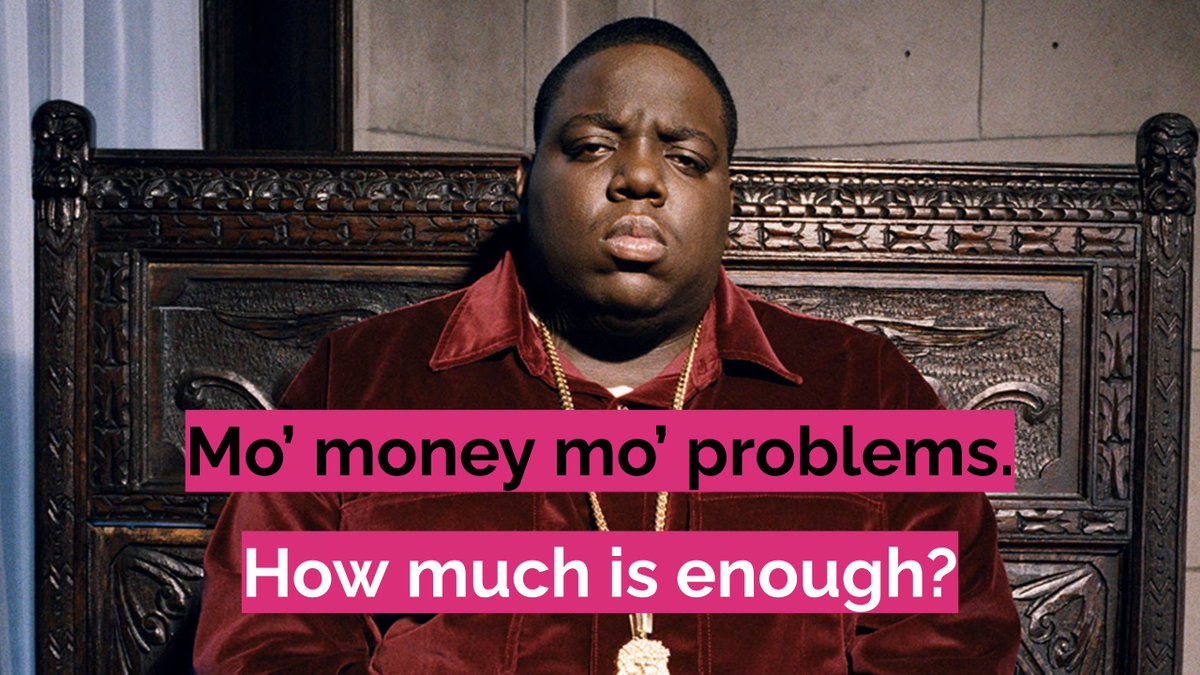💰The Top 5 Money Moves of the Rich
Let’s face it: Our financial system is rigged in favor of the wealthy. Rich people make “money moves” that most Americans simply can’t—I’ll explain 5 of them in this 🧵.
The solution to this inequality isn’t to take from the wealthy... 👇
Let’s face it: Our financial system is rigged in favor of the wealthy. Rich people make “money moves” that most Americans simply can’t—I’ll explain 5 of them in this 🧵.
The solution to this inequality isn’t to take from the wealthy... 👇
...it's to make those same money moves available to everyone.
Unfortunately banks have done almost nothing to help regular working Americans get ahead—in fact they’ve done the opposite, offering their best services exclusively to the rich while nickel-and-diming everyone else.
Unfortunately banks have done almost nothing to help regular working Americans get ahead—in fact they’ve done the opposite, offering their best services exclusively to the rich while nickel-and-diming everyone else.
The good news is that help is on the way. A revolution has begun…
Let's dive in and take a closer look:
There are 2 reasons most people can’t make the best money moves...
Let's dive in and take a closer look:
There are 2 reasons most people can’t make the best money moves...
ACCESS: Some of the best money moves...
☑️Require a minimum of $100k or more
☑️Require that you are accredited (income over $200k or a net worth of one $1 million)
☑️Require the right connections
And even if you have these things you need...
☑️Require a minimum of $100k or more
☑️Require that you are accredited (income over $200k or a net worth of one $1 million)
☑️Require the right connections
And even if you have these things you need...
EXPERTISE: Most people simply don’t have the expertise (or time) to orchestrate complicated financial moves w/ lots of math, confusing jargon, & fine print. The wealthy can afford to pay others to help & geeks like me can do it on their own.
What about the rest?
What about the rest?
Think of it this way:
If you have a toothache you wouldn’t study up on dentistry then start drilling your tooth. You’d go to a dentist. But in personal finance we’re expected to be our own dentist. It’s nuts & frankly it’s shameful that banks haven’t done more to help.
If you have a toothache you wouldn’t study up on dentistry then start drilling your tooth. You’d go to a dentist. But in personal finance we’re expected to be our own dentist. It’s nuts & frankly it’s shameful that banks haven’t done more to help.
💊 Just as in big pharma where there’s no money to be made in cheap cures, banks think there’s no money to be made helping people with less money make smart financial moves. I don't buy that.
So what are these money moves I keep talking about?
Here are the big 5:
So what are these money moves I keep talking about?
Here are the big 5:
1⃣The rich borrow against appreciating assets to buy more assets
Jeff Bezos drew a lot of attention when he bought a half billion dollar yacht with a loan against his Amazon stock, then wrote off a huge chunk of the yacht through depreciation. This is an extreme example but...
Jeff Bezos drew a lot of attention when he bought a half billion dollar yacht with a loan against his Amazon stock, then wrote off a huge chunk of the yacht through depreciation. This is an extreme example but...
...it’s something rich people do every day—I call it the “double dip”. They borrow against appreciating assets to buy... more appreciating assets.
https://twitter.com/JamesonCamp/status/1447213596262424576?s=20
We tend to assume we can’t do the same thing but that’s not true. Many of us have the perfect asset for this move—it’s called the home.
There is $25 trillion (!) of equity locked up in homes in the US. You can borrow against that equity at low interest rates and use it...
There is $25 trillion (!) of equity locked up in homes in the US. You can borrow against that equity at low interest rates and use it...
...to buy other appreciating / cash-flowing assets. It's a great way to get started.
The problem is that this is a pretty complicated maneuver if you want to do it safely.
How to tap home equity? How should it be redeployed?
The problem is that this is a pretty complicated maneuver if you want to do it safely.
How to tap home equity? How should it be redeployed?
2⃣The rich invest in real estate (& other private market assets)
Almost all wealthy people own real estate, either directly or indirectly. For many it’s 20-60% of their new worth (I’m personally at 60%).
Why?
Almost all wealthy people own real estate, either directly or indirectly. For many it’s 20-60% of their new worth (I’m personally at 60%).
Why?
Because over time RE generally appreciates (and is a hard asset, limiting downside) and you can lever it with debt. RE is unique in that the whole system is set up to help you succeed.
Again, your home is a great place to start 👇
Again, your home is a great place to start 👇
https://twitter.com/Camp4/status/1339689320781758466?s=20
Next you can buy other RE either directly or as a passive LP in private deals offered by a GP (this is what I do). The #REtwit community is an incredible place to learn more about this. Start with @moseskagan, @fortworthchris, and @sweatystartup.
If you want to look beyond RE there are many other types of cash-flowing assets, including small businesses (for example, a laundromat). @Codie_Sanchez is a great resource for this.
https://twitter.com/soundslikecanoe/status/1430908452591656962?s=20
3⃣The rich compound over the long term (at double-digit rates)
There’s a ton of talk on twitter about compounding, which basically means investing money, leaving it alone for a long time, and letting math do its work.
As they say, 99% of compounding is… doing nothing.
There’s a ton of talk on twitter about compounding, which basically means investing money, leaving it alone for a long time, and letting math do its work.
As they say, 99% of compounding is… doing nothing.
It’s hard to grasp the power of compounding until you see the numbers. As I’ve written before, compounding at 6 or 8% is nice, but the wealthy compound at higher rates and get exponentially higher returns over the long run.
https://twitter.com/Camp4/status/1417220389206298637
@Keith_Wasserman is a great follow for all things compounding.
Are you starting to see how these moves all work together?
Borrow against appreciating assets (move 1), invest in other appreciating assets like RE (move 2), then compound (move 3).
Are you starting to see how these moves all work together?
Borrow against appreciating assets (move 1), invest in other appreciating assets like RE (move 2), then compound (move 3).
4⃣The rich avoid debt except as leverage.
We Americans have an insatiable appetite for debt and banks (and fintechs) are happy to feed that hunger with credit cards, personal loans, and most recently a glut of buy-now / pay-later products.
📢Hear this:
We Americans have an insatiable appetite for debt and banks (and fintechs) are happy to feed that hunger with credit cards, personal loans, and most recently a glut of buy-now / pay-later products.
📢Hear this:
The only smart way to use debt is as leverage to buy appreciating and/or cash-flowing assets. Otherwise—with very few exceptions—debt should be avoided & eliminated. Of course this is easier said than done.
💊Per my earlier big pharma analogy, there’s no money to be made helping people avoid or reduce debt—so things are only getting worse. I won’t get into all the ways to tackle debt—for now I’m just pointing out that banks should do more to help *reduce debt*, not just add to it.
5⃣The rich turn *everything* into a money move.
The smartest rich people I know seem to make money coming & going. Do you know people like that?
Whether it’s a vehicle purchase, a vacation, or a hobby they hack the system in clever ways, constantly building wealth.
The smartest rich people I know seem to make money coming & going. Do you know people like that?
Whether it’s a vehicle purchase, a vacation, or a hobby they hack the system in clever ways, constantly building wealth.
It’s a *mindset* and it can start with turning things you already own into cash flow.
For example, @NikkiRogersOP rents her family’s RV to earn cash flow (and a free RV for their vacays).
For example, @NikkiRogersOP rents her family’s RV to earn cash flow (and a free RV for their vacays).
https://twitter.com/NikkiRogersOP/status/1448717992230100994?s=20
What we're really talking about here is applying the principle of compounding to everything.
Here’s a dead simple litmus test for most things in life 👇
Here’s a dead simple litmus test for most things in life 👇
https://twitter.com/wisdom_theory/status/1449715806930149379?s=21
I could write a 🧵on each of these moves & still only scratch the surface. And that’s my point.
This stuff is complicated & we all need help. My new project, Swell, aims to make money moves like this easy for everyone (there’s a link in my bio to sign up… and get a free 👕). 🤙
This stuff is complicated & we all need help. My new project, Swell, aims to make money moves like this easy for everyone (there’s a link in my bio to sign up… and get a free 👕). 🤙
• • •
Missing some Tweet in this thread? You can try to
force a refresh
























